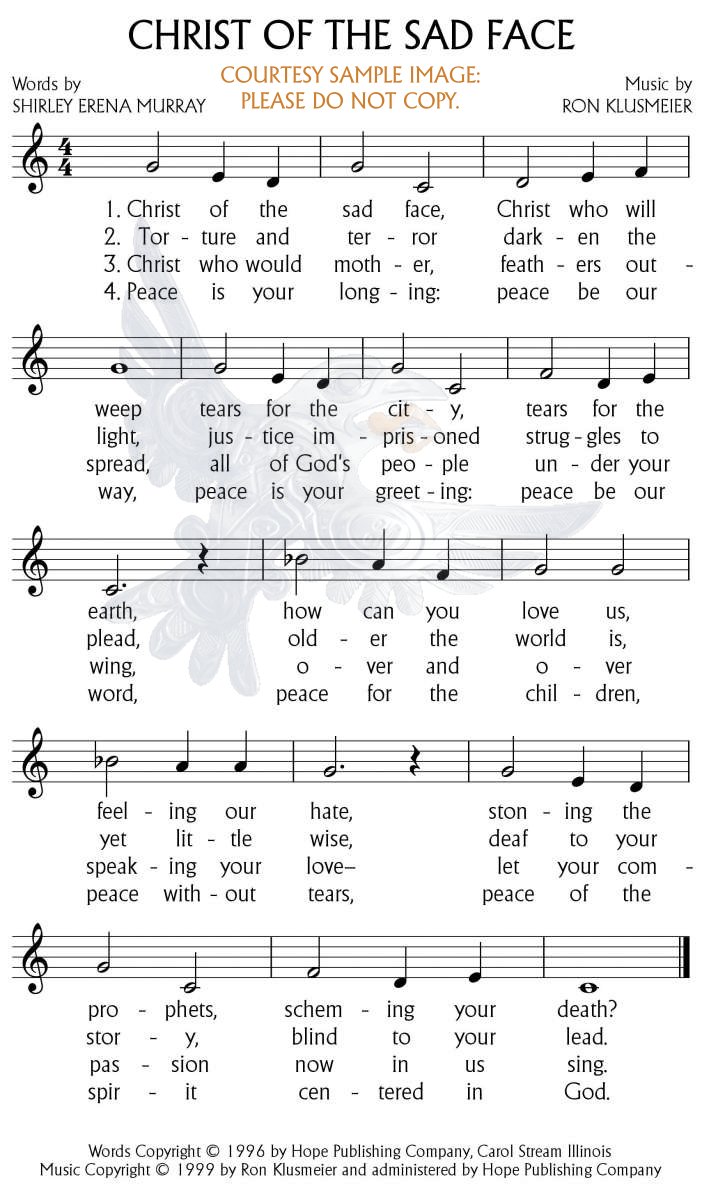Christ of the Sad Face
reflecting some of the Gospel readings for Holy Week
Music by Ron KlusmeierWords by Shirley Erena Murray
Tune Name: WELLINGTON

Lyrics as Poetry
Christ of the sad face, Christ who will weep
tears for the city, tears for the earth,
how can you love us, feeling our hate,
stoning the prophets, scheming your death?Torture and terror darken the light,
justice imprisoned struggles to plead,
older the world is, yet little wise,
deaf to your story, blind to your lead.Christ who would mother, feathers outspread,
all of God’s people under your wing,
over and over speaking your love —
let your compassion now in us sing.Peace is your longing: peace be our way,
peace is your greeting: peace be our word,
peace for the children, peace without tears,
peace of the spirit centered in God.
Words by
Shirley Erena MurrayCopyright © 1996 by Hope Publishing Company
Carol Stream, Illinois • USA
Audio Sample for "Christ of the Sad Face"
Sheelah Megill sings all four verses. Note that Verse 3 is sung up a minor third in 'Eb'. Verses 1, 2 & 4 are in the key of 'C' as notated at left.
Scripture References
- Isaiah 53:3
- Matthew 10:13
- Matthew 24
- Luke 13
- Luke 13:34
- Luke 22:24-27
- Luke 22:54-62
- John 14:27
- John 20:19-23
- John 21:1-19
Season, Theme
or Subject
- Compassion
- Heal, Healing
- Justice, Human Rights
- Lent
- Maundy Thursday
- Prophets, Prophecy
Presentation Suggestions
Not yet available for this title. Contact us if you are a subscriber (or purchaser of this title) and need this item.
Projection Images
This feature is only accessible to Subscribers or those who have purchased this Single Title.
Use the link below for instructions on how to use the Projection Images in Powerpoint and Keynote.
Learn moreProjection Images
Available for This Title
16:9 Words Only
16:9 Words With Music
16:9 Words With Images
4:3 Words Only
4:3 Words With Music
4:3 Words With Images
Accompaniment Recordings
Not yet available for this title. Contact us if you are a subscriber (or purchaser of this title) and need this item.
-
Subscribe To All Titles
unlimited annual access to everything on this site
-
Purchase
This Title
unlimited access to all versions of this title
-
unlimited access to an individual version of this title
Purchasers and Subscribers
Click links below to download your versions.
Versions Available for This Title
Melody Line Versions (includes transposing instruments)
-
Melody Line: 'C' Instrument or Vocal
-
Melody Line: 'C' Instrument 8va
-
Melody Line: Bass Clef 'C' Instrument
-
Melody Line: Alto Clef Instrument
-
Melody Line: ‘Eb’ Instrument
-
Melody Line: ‘F’ Instrument (high)
-
Melody Line: ‘F’ Instrument (low)
-
Melody Line: ‘Bb’ Instrument
Piano Versions
-
Piano: Hymn-style
-
Easy Piano: Hymn-style
Hymn-style Vocal Harmonizations (accompany with any piano versions)
-
Hymn-style: SATB voices
-
Hymn-style: SAB voices
Guitar Chords & Bass Progressions
-
Guitar & Bass: Full chords in keyboard key
-
Guitar: Transposed capo chords
Comments About Song
Comment by SHIRLEY ERENA MURRAY
from her books
“Every Day in Your Spirit” (#5) and
“Faith Makes the Song” (#7):
“This hymn finds its source in the Gospel readings for Holy Week (Matthew 24, Luke 13). The words reflect on our slowness to be caught up in Jesus’s passion for peace and justice.”
Every Day in Your Spirit
and
Faith Makes the Song
are published by:Hope Publishing Company
Carol Stream, IL USA
A Reflection by
WALTER FARQUHARSON
This is not a comfortable hymn. It’s too honest.
“Christ of the sad face, how can you love us?”
Remember the story in John’s Gospel where the risen Christ cooks breakfast for the disciples who had gone off fishing and caught nothing. John says that after they had eaten Jesus asks, “Simon Peter, do you love me?” Peter replies “Yes, Lord, you know I love you.” Three times the question is asked, three times it is answered in the same way. The Gospel writer records “Peter felt hurt because Jesus asked the question three times.” Peter was hurt. To the depth of his being, I would think. None of us like being put on the spot. None of us want to hear the challenge that throws our discipleship, our truthfulness, our sincerity, our depth into question. Peter was hurt but he knew that in his heart there was a “Yes, but…” He knew that just days earlier he had denied ever knowing Jesus. He didn’t want to be counted with any disturbance, any radical thinking, having any hand in what has been called “good trouble”.
Peter knew his love had limits and those limits were too much a part of him. Our captivity to so many isms – racism, sexism, and their many cousins – and our denial of them having any place in our thoughts, attitudes or actions are all reflections of our own sitting exactly where Peter sat. We wish Jesus would take his eyes off us and turn to one of the others. After all, they are all as guilty as I am.
Peter knew. We know too.
We haven’t earned God’s love and we need to remember that when we would judge or condemn another.
Shirley’s hymn is grounded in the gospel account of Jesus – who he was, what he did. It also wraps round our own places of challenge as individuals, as communities, societies and nations. There is concern for the earth itself, for the cry for justice from oppressed people, the unholy reality of poverty and excess living side by side. “Yes Lord I love you, but I don’t want that to hurt, I don’t want that to cost me too much. I don’t want to be disturbed if I am comfortable.”
“Christ of the sad face,
Christ who will weep
tears for the city,
tears for the earth,
how can you love us,
feeling our hate,
stoning the prophets,
scheming your death?”
We have not earned God’s love. God is love. That is good news. It is grace but not the slippery kind of grace peddled by religious hucksters, a grace that can be possessed by us and doled out in turn by us if we so choose. God is simply God.
“Christ who would mother,
feathers outspread,
all of God’s people
under your wing,
over and over
speaking your love –
let your compassion
now in us sing.”
This hymn’s last verse speaks of where Peter was, and where we come to be when we have truly seen and heard the Christ of the sad face. We understand the essential knowledge that the heart of Christ is God’s heart and Christ’s intention is God’s intention. “Peace is your longing … peace is your greeting.” It therefore follows that our intention must be that peace will be our way, peace be our word, our bond.
“Feed my sheep. Feed my lambs.”
“…peace for the children,
peace without tears,
peace of the spirit,
centred in God.”
An activity: Read again John 21:1-19. Without getting into conversation with anyone, enter a quiet time of reflection. First, imagine you are Peter hearing Jesus’ question and answering it. What do you imagine Peter’s thoughts and feelings to be? What kind of time passes between each question and its answer? If you choose, you might write this little drama down as it unfolds. Then think about what Peter might think about this exchange the next day. A year later.
Repeat the exercise but imagine this is an exchange between Jesus and you.
If this is done during a group study some time might be spent having participants share with one other person or with two or three others. Each shares only if they wish to and only what they wish to. I would recommend this be a sharing, not a discussion or a time to ask questions or make comments about what anyone has shared. Close the time with a re-reading of verse 4 of this hymn.